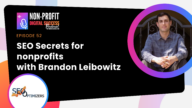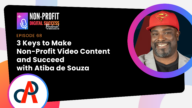
Search is changing fast, and non-profits need fresh digital strategies. With AI reshaping discovery, traditional SEO isn’t enough. To reach donors, volunteers, and supporters, your content must now work harder than ever.
If your non-profit relies on web traffic for donations or engagement, understanding these changes is crucial. The question isn’t whether AI will affect your visibility; it already has.
The real challenge is adapting efficiently with limited resources. Here’s how to navigate AI‐driven search while staying true to your mission.
How AI Search Engines Work (and Why They’re Different)
Modern search tools don’t just retrieve links. They interpret intent. Where older algorithms matched keywords, new AI models analyze context, nuance, and even multimedia to deliver precise answers.
Explore how ethical considerations are emerging alongside these innovations. (Learn more about ethical AI use in the non-profit world in our podcast with Joanne Toller)
Key Players Shaping Search in 2025:
- Google: Now integrates AI Overviews, blending text, images, and voice queries for comprehensive results.
- Bing: Focuses on conversational answers, turning search into a dialogue.
- Gemini: Excels at understanding complex questions and serving tailored responses.
- Emerging platforms: Tools like Perplexity.ai and You.com prioritize instant, context-rich answers.
For non-profits, this means content must demonstrate value.
A fact sheet about homelessness in Toronto won’t rank unless it directly addresses what searchers need, whether that’s volunteer opportunities, donation impact data, or local shelter details.
Why Gemini Matters for Non-Profits
Gemini represents the next leap in search. It doesn’t just fetch information; it synthesizes answers by understanding subtleties in language and intent.
How This Helps Smaller Non-Profits:
- Niche visibility: A local animal rescue’s guide to fostering cats may outrank a national organization’s generic content if it better matches user queries.
- Multimedia advantage: Uploading videos or infographics? Gemini evaluates them alongside text, so diversifying content formats boosts reach.
- Conversational optimization: FAQs structured in plain language (e.g., “How do I volunteer with seniors in Toronto?”) perform better than jargon-heavy paragraphs.
Case in point: An Ontario food bank’s blog post, “Where to Donate Groceries Near Me”, gained prominent placement in Gemini results because it precisely answered a common local query.
AI’s Double-Edged Sword: Zero-Click Searches
Traffic declines are a growing pain for non-profits. When AI serves answers directly on results pages, fewer users click through to websites.
- Snippet optimization: Structure content with clear headers and concise answers (40–60 words) to increase snippet chances.
- Brand reinforcement: Mention your organization’s name early so that users remember you even without visiting your site.
- Conversions beyond clicks: Offer downloadable resources (e.g., “10 Ways to Support Climate Action”) to incentivize visits.
(For further guidance on improving online visibility in the age of zero-click searches, see SEO Tips to Boost Nonprofit Visibility and Impact)
Track metrics like donation conversion rates, not just visitor counts, to gauge real impact.
Have David support you with 1:1 sessions
Actionable Strategies for 2025
- Leverage AI Wisely
- Use tools like ChatGPT or Claude to brainstorm long-tail keywords (e.g., “affordable housing grants for nonprofits Alberta”).
- Try free AI-powered SEO assistants like SurferSEO to audit content gaps.
- Double Down on E-E-A-T
- Showcase staff expertise with author bios and credentials.
- Publish case studies with data (e.g., “How $50 Feeds a Family for a Week”).
(Non-profits planning their future growth can benefit from a solid strategic framework – explore the Quarterly Strategic Planning Guide for Non-Profits)
- Diversify Content Types
- Turn blog posts into videos or podcasts. AI can repurpose transcripts.
- Build interactive tools (e.g., a “Fundraising Impact Calculator”).
- Collaborate for Authority
- Partner with local influencers or academics to co-create content. Backlinks from .edu or .gov sites boost trust.
(As you plan for 2025, consider integrating advanced digital tools – find out How Digital Tools Enhance Non-Profit Efficiency)
The Road Ahead
AI won’t replace the need for authentic storytelling. It will amplify it. Non-profits that pair mission-driven content with smart adaptations will thrive.
Focus on clarity over clicks. A well-optimized FAQ page might generate fewer visits than before, but if it leads to more volunteer signups, that’s success.
(Thinking ahead? Get inspired by future-focused insights from Non-Profit Growth Strategies for 2025)
Quick Takeaways:
- Optimize for questions, not just keywords.
- Monitor zero-click trends but prioritize conversions.
- Start small: Audit one key page with AI tools this month.
Search is changing. Your mission shouldn’t have to.
Curious how AI is changing SEO for non-profits?
Adapting your strategy doesn’t have to be overwhelming. Even small tweaks can improve your visibility, attract more supporters, and boost donations. Let’s explore how to future-proof your online presence. Book a free consult and start turning searches into impact.










0 Comments